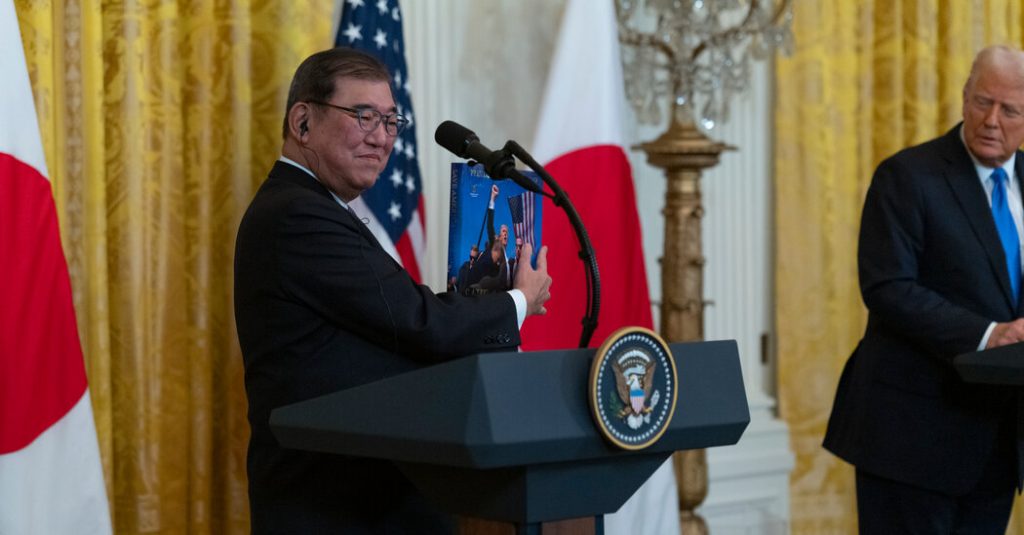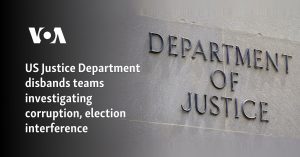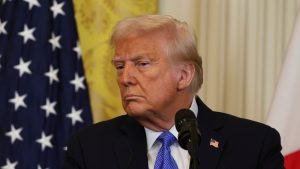Shortly after President Trump mused Friday over imposing tariffs on Japan while sitting alongside the country’s prime minister, Shigeru Ishiba, the Japanese leader was asked by a reporter to reflect on his first meeting with Mr. Trump. It was a prime opportunity to respond to Mr. Trump’s economic threat.
Instead, Mr. Ishiba took a different tack — becoming the latest foreign leader to fawn over, rather than flout, the American president.
“I was so excited to see such a celebrity on television,” Mr. Ishiba said, prompting Mr. Trump to turn to him and smile from ear to ear. “On television he is frightening, and he has a very strong personality, but when I met with him, actually, he was very sincere and very powerful, and with strong will for the United States.”
Mr. Ishiba assured the reporters and White House officials in assembly that his compliments for Mr. Trump were not an attempt to “suck up to him,” but rather part of an effort to ensure “world peace” and “regional stability.”
Mr. Ishiba is the latest foreign emissary to employ the art of flattery with a president known for his transactional, if not unpredictable, approach to foreign policy. Mr. Trump’s predecessor, Joseph R. Biden Jr., often said that foreign leaders would privately express concern to him over the prospect of Mr. Trump’s return to the White House. Now that he’s back, any concerns appear to have been put aside — at least in public.
Days before Mr. Ishiba complimented Mr. Trump’s presence on television, Prime Minister Benjamin Netanyahu called Mr. Trump “the greatest friend Israel has ever had in the White House,” adding that he has “enormous respect” among Israelis. He commended Mr. Trump’s ability to “cut to the chase.” President Nayib Bukele of El Salvador made an unusual gesture, proposing that Mr. Trump jail undocumented migrants — and even convicted American citizens — in the Central American nation’s notorious prison complex.
“People seem to think flattery is going to work for what they need, that it will win them points,” said Elizabeth Shackelford, a former diplomat who worked in Poland, South Sudan and Somalia before resigning in protest of Mr. Trump’s first presidency. “Perhaps they think that by being nice to him they’ll be less likely to be the ones that are in his wrath when he lashes out.”
It is not a new strategy. During the first Trump administration, President Emmanuel Macron of France gushed over Mr. Trump at the White House, telling him that he hoped their “friendship” and “kinship” would continue to grow. Poland offered to rename a U.S. military base Fort Trump. Mr. Netanyahu proposed that an Israeli settlement in the Golan Heights be renamed Trump Heights. Prime Minister Justin Trudeau of Canada went on a charm offensive, inviting Mr. Trump’s daughter Ivanka to take part in a meeting of female business leaders.
The flattery did not always work. By 2018, Mr. Trump had imposed tariffs on Canada and called Mr. Trudeau “dishonest & weak” on social media. Mr. Trump and Mr. Macron’s bromance morphed into a public feud over the direction of NATO. Mr. Trump would later erupt at Mr. Netanyahu when he congratulated Mr. Biden on his victory in the 2020 election. He published coffee-table books with criticism of various foreign leaders, including Mr. Trudeau and Angela Merkel, the former German chancellor, who did not shy away from challenging Mr. Trump.
His 2024 book included 10 pages of photographs with Mr. Trump and Kim Jong-un, the North Korean dictator. Mr. Trump boasted about his “love letters” from the North Korean leader — missives he valued so much that he took them to Mar-a-Lago after office. The National Archives later sought to retrieve them along with other documents Mr. Trump kept, in what ultimately led to a federal inquiry and prosecution.
Ms. Shackelford described the attempt to use flattery as a means to gain favor with Mr. Trump as a “fool’s errand.”
“I don’t think that anybody is going to get what they want from Trump,” Ms. Shackelford said. “He will use them as long as it’s convenient for him. But he doesn’t have any problem cutting people off. You don’t earn points from Trump because he doesn’t give you credit for that later.”
“When it suits him, he’ll just pretend like it never happened,” she added.
That has not stopped leaders from trying. Presidents and prime ministers flocked to Mar-a-Lago even before Mr. Trump made it to office. A delegation from Canada made multiple visits to Washington since Mr. Trump’s election, hoping to convince Mr. Trump that the nation was doing enough on border security in an effort to avoid tariffs. The meetings even left some of Mr. Trump’s aides impressed.
Mr. Trump still threatened to upend their economy with tariffs last week before delaying the penalties by 30 days.
Not every leader has been shy to rebuke Mr. Trump. President José Raúl Mulino of Panama said this week the Trump administration was spreading “lies and falsehoods” after the State Department claimed American ships would be able to pass through the Panama Canal without paying. The Panamanian government has also rejected Mr. Trump’s statements about retaking ownership of the Panama Canal.
But most leaders have chosen to rely on flattery, including diplomats, who are well-practiced in that art. Peter Mandelson, a veteran British politician once known as the “Prince of Darkness,” had years ago called Mr. Trump a “white nationalist” and said he was “a danger to the world.”
His selection by King Charles III to be the new British ambassador to the United States triggered a wave of intense opposition among some of Mr. Trump’s allies, including Stephen K. Bannon, his onetime chief strategist.
The result was a remarkable example of political flattery. Mr. Mandelson appeared on Fox News at the end of January to say that he had completely changed his mind about the president.
Mr. Mandelson said that his prior remarks had been “ill judged and wrong” and that he was “impressed not just by the extraordinary second mandate that he’s received from the American people, but the dynamism and energy with which he approached not just the campaign, but government as well.”
Hie continued by saying that “he has won fresh respect — he certainly has from me” and he predicted that Mr. Trump “could become one of the most consequential American presidents I have known in my adult life.”
Speaking just a week after Mr. Trump’s inauguration, Mr. Mandelson noted that the president’s approach to government had been “so much more organized, it’s so much more coherent, he seems to be so much clearer in what he wants to do. We take encouragement from that.”
In the days that followed the apologia, Mr. Mandelson’s appointment appeared to be back on track.
Mr. Ishida seems to be hoping for a similar response from Mr. Trump. Asked on Friday if he was prepared to issue retaliatory tariffs against Mr. Trump, Mr. Ishida said, “I’m unable to respond to a theoretical question.”
“That’s a very good answer,” Mr. Trump said as the crowd in the White House laughed. “Very good answer, wow. That’s very good. He knows what he’s doing.”
Michael D. Shear contributed reporting.








